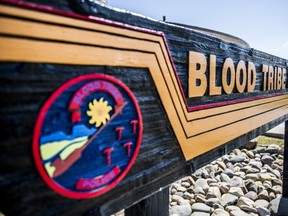Kainai Blood Tribe report says 95 per cent of members experienced racism

Article content
A new report from the Kainai Blood Tribe in southern Alberta found 95 per cent of the nation’s members reported experiencing racism at some point in their life.
The report aimed at addressing racism in the community and neighbouring towns and cities was released Thursday after two years of research. Dr. Gabrielle Lindstrom, an assistant professor of Indigenous Studies at Mount Royal University and a principal researcher on the project, said racism was defined through an Indigenous perspective and the report found a large majority of people from the Kainai had experienced some form of discrimination, with many experiencing it in their childhood.
“Our research shows that for many Blood Tribe members, experiences with racism begin early in childhood and stay with people throughout their lives,” said Lindstrom. “Racism is certainly an enduring and persistent presence that negatively affects all aspects of life, and when I say all aspects, the research looks at systemic racism and interpersonal racism as well.”
A community notice published by the Kainai Blood Tribe says the report began several years ago after members experienced blatant acts of racism. Lindstrom said in the two years researchers worked on the study, they engaged with elders as well as community members and non-Indigenous people from the area, using an Indigenous research method and mixed methods research design. There were also discussions with municipal, education and law enforcement leaders.
The report had three main goals: to reduce racism and its effects on Indigenous people, to increase awareness of racism toward Indigenous people, and to identify the root cause of racism toward Indigenous people.
“Another high-level finding is that we found a very profound misalignment or disconnect between what non-Indigenous people understand racism to be or how they think about racism, and how Indigenous people actually experienced a huge disconnect there,” said Lindstrom. “If one has not experienced what it feels like to be treated differently because you are Indigenous . . . It’s very difficult to understand what that feels like.”
A survey of non-Indigenous people in the area found 61 per cent of people felt they were allies to Indigenous people, 17 per cent were considered bystanders and 22 per cent were deniers.
Lindstrom said they also found current education and training models around racism are not finding positive results.
“These are relatively ineffective in eliminating let alone addressing the health risks that have been normalized in society,” said Lindstrom. “Racism is learned, it begins in the home and it’s reinforced in society, and it’s normalized in society in ways where it functions almost invisibly and there’s no kinds of professional training methods to disrupt these kinds of really deeply held beliefs.”
Lindstrom said the report recommends reframing definitions around racism and the ways communities think about racism, as well as working toward better training and education on the subject. She said the Blood Tribe will also work toward creating an anti-racism coalition to begin healing from the effects of racism.
“Racism takes away from the very humanity of those who hold racist beliefs, who hold racist attitudes. They’re losing out on creating relationships with some pretty awesome human beings,” said Lindstrom.






Postmedia is committed to maintaining a lively but civil forum for discussion. Please keep comments relevant and respectful. Comments may take up to an hour to appear on the site. You will receive an email if there is a reply to your comment, an update to a thread you follow or if a user you follow comments. Visit our Community Guidelines for more information.